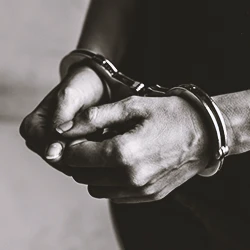If you are facing criminal mischief charges, you could be looking at significant penalties, including fines ranging from $500 to $5,000 or even jail time, depending on the offense's severity and the damage's extent.
On the other hand, if someone else's actions have damaged your property, you may be entitled to compensation for your losses.
Criminal mischief involves intentionally damaging another person's belongings without permission, and it has been a persistent issue throughout history. However, the complexities surrounding these cases often make it challenging to determine guilt or intent. Was the damage accidental or deliberate?
As an experienced criminal defense lawyer, I can tell you that the nuances of each situation matter greatly. This article is designed to clarify whether you are a defendant facing charges or a victim seeking understanding and restitution.
Quick Summary
- Criminal mischief cannot occur unintentionally; intent is crucial in these cases.
- If your property has been damaged, you may be eligible for compensation to restore your losses.
- The extent of the damage caused determines the severity of penalties for criminal mischief. Fines can vary significantly based on the specifics of each case.
What Is Criminal Mischief?

Nevertheless, each state has its specific definition of what constitutes criminal mischief, so you should be aware of the distinctions between them [1].
Often, people are familiar with the term vandalism to refer to criminal mischief. It can range from simply spray-painting graffiti on a building wall to breaking glass windows, and in some cases, may even involve trespassing.
The severity of the damage may differ, yet regardless of its magnitude, it remains a crime.
Criminal mischief is also commonly referred to as malicious mischief and is classified as a property damage crime under state criminal law. Unlike accidents or negligence, criminal mischief requires intent or recklessness and involves damaging, defacing, or destroying property without the owner’s consent.
Examples of Criminal Mischief Cases
Keying a Car
- A person deliberately scratches the paint of a parked car with a key, causing significant damage.
- Approximate Penalties: Depending on the extent of the damage, penalties can range from $500 to $2,500 in fines and potential jail time of up to 6 months for misdemeanor charges.
Breaking Windows
- During a heated argument, an individual throws a rock through a neighbor's window, causing both property damage and safety concerns.
- Approximate Penalties: This act can lead to fines between $1,000 and $5,000, and if the damage exceeds a certain amount, it could escalate to felony charges with longer jail sentences.
Damaging Mailboxes
- Teenagers vandalize a mailbox by smashing it with a baseball bat.
- Approximate Penalties: Damaging a mailbox is often considered a misdemeanor, with fines typically ranging from $250 to $1,000 and possible community service (public service) requirements.
Tampering with Security Cameras
- An individual disables or damages security cameras on someone else's property to conceal illegal activities.
- Approximate Penalties: Tampering with security devices can incur fines of up to $2,500, along with potential jail time, depending on the severity of the tampering and any associated criminal activities.
Property Damage During Domestic Disputes
- In the heat of an argument, one partner intentionally damages furniture or appliances belonging to the other partner.
- Approximate Penalties: This type of damage can lead to criminal mischief charges with fines ranging from $500 to $3,000, and if it occurs repeatedly or involves significant destruction, it could result in felony charges.
Understanding these scenarios can help individuals navigate legal challenges related to property
Related Article: Robbery vs Burglary
Differences Between Criminal Mischief and Vandalism
While often used interchangeably, there are distinctions:
- Criminal Mischief: Generally refers to any intentional damage to property, which can include a wide range of actions from minor damage to significant destruction. It can also encompass acts like tampering with property.
- Vandalism: Specifically focuses on defacing or destroying property, often in a public context (e.g., graffiti). Vandalism is usually categorized under criminal mischief but emphasizes the act of defacement.
Criminal Mischief vs Accidental Property Damage
Criminal mischief differs from accidental property damage because it requires intent or recklessness. Accidental damage, such as unintentionally breaking property, is typically handled as a civil matter rather than a criminal offense.
This distinction is critical when determining whether criminal charges apply or whether the issue is limited to civil liability.
Characteristics of Criminal Mischief
Intent is the defining element of criminal mischief, separating it from negligence-based property damage and determining whether the conduct qualifies as a criminal offense.
For the accused to be found guilty of criminal mischief, the prosecutor must demonstrate several necessary components beyond a reasonable doubt.
Specifically, they must establish the following:
- The prosecutor must establish beyond reasonable doubt that the defendant deliberately caused harm to someone else's tangible property.
- A valid criminal mischief case would not be warranted if the defendant had been granted consent by the owner to modify or destroy a specific tangible property.
- The motivation behind this act was not to create destruction, rob, or steal. Proving one of these crimes in court will require different evidence and supporting documentation.
Types of Criminal Mischief
To secure a conviction against an individual, the prosecution must establish beyond any doubt that they have indeed committed criminal mischief, whether in graffiti, vandalism, sabotage, defacement, or breakage.
There are two types of criminal mischief that one should be aware of:
- misdemeanor criminal mischief
- felony criminal mischief
Many states differentiate between different degrees of criminal mischief based on either the amount of damage done or whether specific property or specific elements are involved.
- Mark Theoharis, Attorney
Degrees of Criminal Mischief: A Comprehensive Overview
Criminal Mischief Penalties

Generally, misdemeanors of criminal mischief will likely lead to fines of up to $1,000 or jail time for up to one year.
Grave offenses classified as felonies, however, have much more severe repercussions, such as years in prison or hefty financial penalties.
Recognizing that these are just general rules is essential, and certain cases can differ significantly.
Nevertheless, some common punishments include:
- Fines
- Probation or Community Service
- Incarceration
- Paying Restitution to the Victims
When criminal mischief occurs, compensation attempts to compensate for any harm inflicted on someone's residence or possessions.
It must be noted that restitution stands apart from other charges and fines, which may also have to be paid by the defendant by prosecution requirements.
First-Time Offender Programs
Many jurisdictions offer first-time offender programs aimed at rehabilitation rather than punishment.
- Diversion Programs: Allow first-time offenders to complete community service or educational courses in exchange for reduced charges or dismissal.
- Restitution Requirements: Offenders may be required to pay restitution to victims as part of their program.
By addressing these critical areas, individuals seeking information about criminal mischief will better understand their rights, potential consequences, and available resources.
Does Criminal Mischief Go On a Permanent Record?
Yes, a conviction for criminal mischief typically results in a permanent criminal record. This can affect various aspects of life, including employment opportunities and background checks. However, some individuals may be eligible for expungement or sealing of their records after a certain period or under specific circumstances.
How Criminal Mischief Affects Employment
Having a criminal mischief conviction can have significant implications for employment:
- Background Checks: Many employers conduct background checks that reveal criminal records. A conviction may hinder job prospects, especially in fields requiring trust and responsibility.
- Professional Licensing: Certain professions may require licenses that could be denied based on a criminal record.
Related Articles:
- Tort vs Criminal Law
- Intentional Tort vs Negligence
- How Long Does a Misdemeanor Stay On Your Record?
Understanding Criminal Mischief Charges and Legal Defenses
Criminal mischief charges can result in serious legal consequences, making it crucial to understand the elements required for conviction, the statute of limitations, and potential defenses. The following is a comprehensive breakdown to help clarify these aspects.
Proving Criminal Mischief Charges
To secure a criminal or malicious mischief conviction, the prosecutor must demonstrate that the defendant willfully or recklessly damaged another's tangible property without permission.
They must also prove the following:
- Intentional or Reckless Act
- Damage To a Person's Property
- Without Consent
Statute of Limitations for Criminal Mischief
The statute of limitations for criminal mischief varies by state but generally falls within 1 to 5 years from the date of the offense. For example:
- Misdemeanors: Typically have a statute of limitations of 2 years in many states.
- Felonies: There may be more extended limits, often around 5 years, depending on the case's specifics. In some jurisdictions, certain serious offenses may not be a time limit.
It's crucial to consult local laws to understand the specific time frames applicable in your state.
Defenses to Criminal Mischief
Various strategies may be available to mount a successful defense to fight the criminal mischief conviction when accused of criminal mischief.
These potential defenses to criminal mischief include:
1. Lack of Authorization
- Definition: The defendant claims they had permission from the property owner to cause the damage.
- Requirements: Evidence of authorization, such as written consent or witness testimony, is needed.
- Counter-Argument: Prosecutors may argue the authorization was revoked or was not valid.
2. Mistaken Identity
- Definition: The defendant argues they were not the one who caused the damage.
- Requirements: The defendant must provide an alibi or evidence proving they were not at the scene.
- Counter-Argument: Prosecutors may challenge the reliability of witness statements or the alibi.
3. Unintentional Damage
- Definition: The defendant argues the damage was accidental, not intentional.
- Requirements: The defendant must show the damage was accidental and not a result of negligent or reckless behavior.
- Counter-Argument: Prosecutors may claim that negligence still constitutes criminal mischief.
4. Justification or Necessity
- Definition: The defendant argues their actions were necessary to prevent greater harm, such as breaking a window to save someone.
- Requirements: The defendant must show that no reasonable alternatives existed and the action was necessary to prevent harm.
- Counter-Argument: Prosecutors may argue that the defendant could have used a less destructive method.
Defending against criminal mischief charges requires a strategic understanding of the available defenses. Each defense has specific requirements and challenges that must be addressed with the help of legal counsel.
By presenting solid evidence and anticipating prosecutor counter-arguments, defendants have a better chance of achieving a favorable outcome.
FAQs
Does Criminal Mischief Include Graffiti?
Yes, criminal mischief includes graffiti. Of the many malicious mischief crimes, using graffiti is one of the most commonly pursued by prosecutors.
Is Criminal Mischief a Felony or a Misdemeanor?
Criminal mischief can be charged as either a misdemeanor or a felony, depending on the value of the property damage, the type of property (public property or private property) involved, and whether the offense is repeated. Minor damage usually results in misdemeanor charges, while extensive or repeated damage may lead to felony prosecution.
What Type of Crime Is Considered Mischief?
The type of crime that is considered mischief depends on the severity of the incident. Mischief can range from a harmless Class C misdemeanor to more serious first-degree felonies.
What Does It Mean to Be Charged With Mischief?
To be charged with mischief means you are accused of willfully and intentionally damaging another person's property without their consent.
Get a Free Case Review with Our Lawyers
Contact a defense attorney in Schmidt & Clark, LLP for a free consultation session if you are charged with mischief. An experienced criminal defense attorney can review your case and determine the best course of action.
Our experience makes us highly qualified to give you legal advice when dealing with criminal mischief charges.
Having a knowledgeable lawyer on your side could make the difference between potentially avoiding or mitigating serious consequences or having them fall into place due to a lack of experienced counsel. For that reason, consult our team at Schmidt & Clark, LLP today!
References:
- https://www.collinsdictionary.com/dictionary/english/criminal-damage
- https://www.legislature.mi.gov/documents/mcl/pdf/mcl-act-175-of-1927.pdf

 Published by
Published by 

